Related Research Articles

Rush was a Canadian rock band formed in Toronto in 1968 that primarily comprised Geddy Lee, Alex Lifeson (guitar) and Neil Peart. The band's original line-up comprised Lifeson, drummer John Rutsey, and bassist and vocalist Jeff Jones, whom Lee immediately replaced. After Lee joined, the band went through a few line-up changes before arriving at its classic power trio line-up with the addition of Peart in July 1974, who replaced Rutsey four months after the release of their self-titled debut album; this line-up was kept intact for the remainder of the band's career.
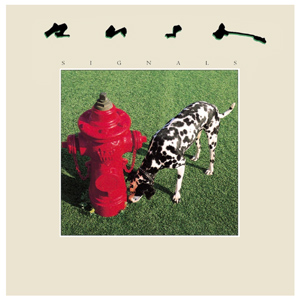
Signals is the ninth studio album by Canadian rock band Rush, released on September 9, 1982 by Anthem Records. After the release of their previous album, Moving Pictures, the band started to prepare material for a follow-up during soundchecks on their 1981 concert tour and during the mixing of their subsequent live album Exit...Stage Left. Signals demonstrates the group's continuing use of synthesizers, sequencers, and other electronic instrumentation. It is the last album produced by their longtime associate Terry Brown, who had worked with them since 1974.
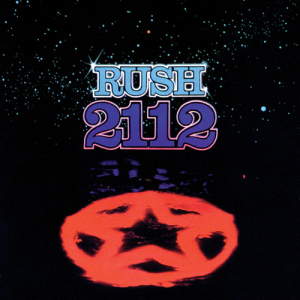
2112 is the fourth studio album by Canadian rock band Rush, released in March 1976 by Mercury Records. It reached No. 5 in Canada and became the band's commercial breakthrough in the US, peaking at No. 61.

Fly by Night is the second studio album by the Canadian rock band Rush, released on February 14, 1975, by Mercury Records. It was the first Rush album to showcase elements of progressive rock for which the band has become known. It was also the first to feature lyricist and drummer Neil Peart, who replaced original drummer John Rutsey the previous summer just prior to the band's first North American tour. Peart took over as Rush's primary lyricist, and the abundance of fantastical and philosophical themes in his compositions contrasted greatly with the simpler hard rock of the band's debut album.
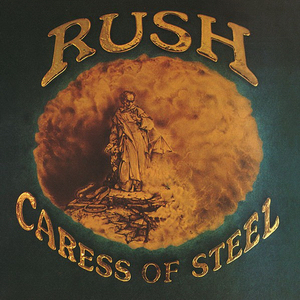
Caress of Steel is the third studio album by Canadian rock band Rush, released on September 24, 1975, by Mercury Records. It was recorded immediately after the band concluded touring in support of their previous album, Fly By Night, and marked a development in the group's sound, moving from the blues-based hard rock style of their debut towards progressive rock. Songs such as "The Necromancer" furthered Rush's advancement into narrative-driven, fantasy-based compositions, while "The Fountain of Lamneth" was their first prog-rock "epic" to span an entire side of vinyl. Other tracks like "Bastille Day" and "Lakeside Park" became staples of the band's live setlists.
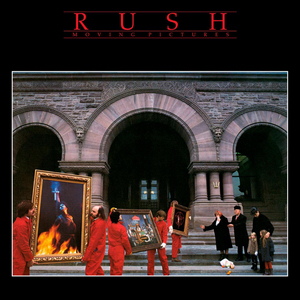
Moving Pictures is the eighth studio album by Canadian rock band Rush, released on February 12, 1981, by Anthem Records. After touring to support their previous album, Permanent Waves (1980), the band started to write and record new material in August 1980 with longtime co-producer Terry Brown. They continued to write songs with a more radio-friendly sound, featuring tighter and shorter song structures compared to their earlier albums.

Different Stages is a live album by Canadian rock band Rush, released in 1998. The bulk of the first and second discs were recorded at the World Music Theatre in Tinley Park, Illinois, during the 1997 Test for Echo tour. Five other songs from various stops along the tour were included and three songs from the 1994 Counterparts tour. The third disc is taken from a performance at the Hammersmith Odeon in London during the A Farewell to Kings tour in 1978.

"Tom Sawyer" is a song by Canadian rock band Rush, originally released on their 1981 album Moving Pictures as its opener. The band's lead singer, bassist, and keyboardist, Geddy Lee, has referred to the track as the band's "defining piece ... from the early '80s".
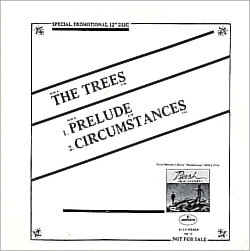
"The Trees" is a song by Canadian rock band Rush, from its 1978 album Hemispheres. The song is also featured on many of Rush's compilation albums. On the live album Exit...Stage Left, the song features an extended acoustic guitar introduction titled "Broon's Bane."
"2112" is a song by the Canadian rock band Rush. It was released as a 20-minute song on their 1976 album of the same name and is the longest single song by the band. The overture and the first section, "The Temples of Syrinx", were released as a single. The song was adapted into a comic booklet, which used the lyrics of the song as lines for the characters and the narrations from the cover as intros.
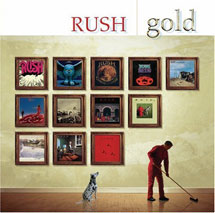
Gold is a compilation album by Canadian rock band Rush, released on April 25, 2006.

"Subdivisions" is a song by Canadian progressive rock group, Rush, released as the second single from their 1982 album Signals.
"A Passage to Bangkok" is a song by Canadian rock band Rush, released in March 1976 by Anthem Records. The song appears on the band's fourth studio album 2112 (1976). With the album's title track comprising the first half of the record, "A Passage to Bangkok" opens the second side of the album.
Malignant Narcissism is an instrumental track from Rush's 2007 album Snakes & Arrows. "Malignant Narcissism" was nominated for a 2008 Grammy under the category of Best Rock Instrumental Performance, Rush's fifth nomination in said category. However, the song lost to Bruce Springsteen's "Once Upon a Time in the West" making it their fifth defeat in that category.
"Freewill" is the second track on the 1980 album Permanent Waves by Canadian progressive rock band Rush. The song's music was composed by Geddy Lee and Alex Lifeson, and its lyrics written by Neil Peart. In a 2016 review of Rush discography for Ultimate Classic Rock, Eduardo Rivadavia described "Freewill" as a "cerebral but remarkably radio-friendly" song. Lee has stated that the final verse of "Freewill" is at the highest part of his vocal range.

"Mission" is a song by Canadian rock band Rush from the 1987 album Hold Your Fire.
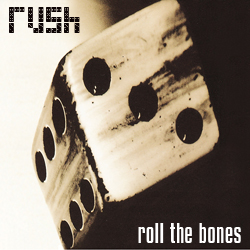
"Roll the Bones" is a song by the Canadian rock band Rush. It was released as the second single from their 1991 album of the same name.

"Force Ten" is a song written, produced and performed by Canadian rock band Rush, released as a promotional single from their album Hold Your Fire. It was the last song written for the album. The song has been critically positively received, and peaked at number 3 on the Billboard Mainstream Rock Tracks chart.
"Witch Hunt" is a song by Canadian rock band Rush. It was released on their 1981 album Moving Pictures, and unlike many other Rush songs it was a true studio production, with a variety of percussion instruments and overdubs, and a separate keyboard player. It is the first of four songs in what has been called the band's "Fear" series, the other three being "The Weapon", "The Enemy Within", and "Freeze", although this song is the third part of the series in order, and went on reverse chronological order by the album.
References
- ↑ "Rush ANALOG KID Chart History". Billboard.
- ↑ Geddy, Lee; Alex, Lifeson; Rush; Neil, Peart (17 December 2007). "The Analog Kid". Musicnotes.com.
- ↑ "The Analog Kid by Rush – BPM – Key – Find Song Tempo". Findsongtempo.com. Retrieved 5 January 2019.
- 1 2 ""Signals" linernotes and more from Power Windows: A Tribute To Rush". 2112.net. Retrieved 5 January 2019.
- ↑ "The Analog Kid". Rushvault.com. 6 February 2011.
- ↑ "Troy Hickman — Holey Crullers! (vol VII/iss 4/April 2004)". Sequential Tart. Retrieved 2012-09-17.
- ↑ "Signals – Rush – Songs, Reviews, Credits". AllMusic .
- ↑ Prog, Jerry Ewing 2016-10-28T18:00:00 301Z. "The Top 10 Best Rush Songs Of The 80s". Prog Magazine.
{{cite web}}: CS1 maint: numeric names: authors list (link) - ↑ Rock, Classic Rock 2015-06-11T09:36:00 161Z Classic. "The 50 Greatest Rush Songs Ever". Classic Rock Magazine.
{{cite web}}: CS1 maint: numeric names: authors list (link)